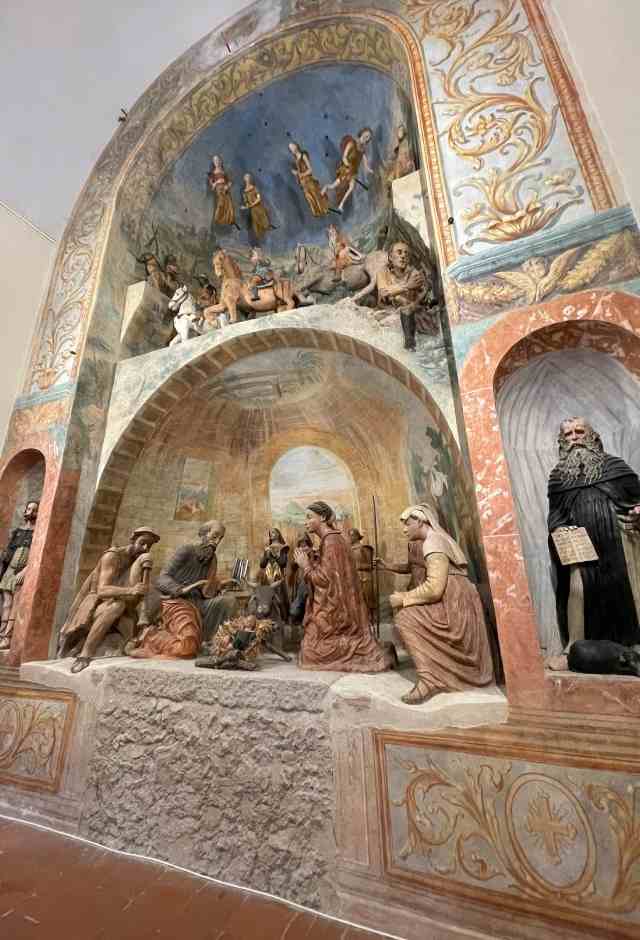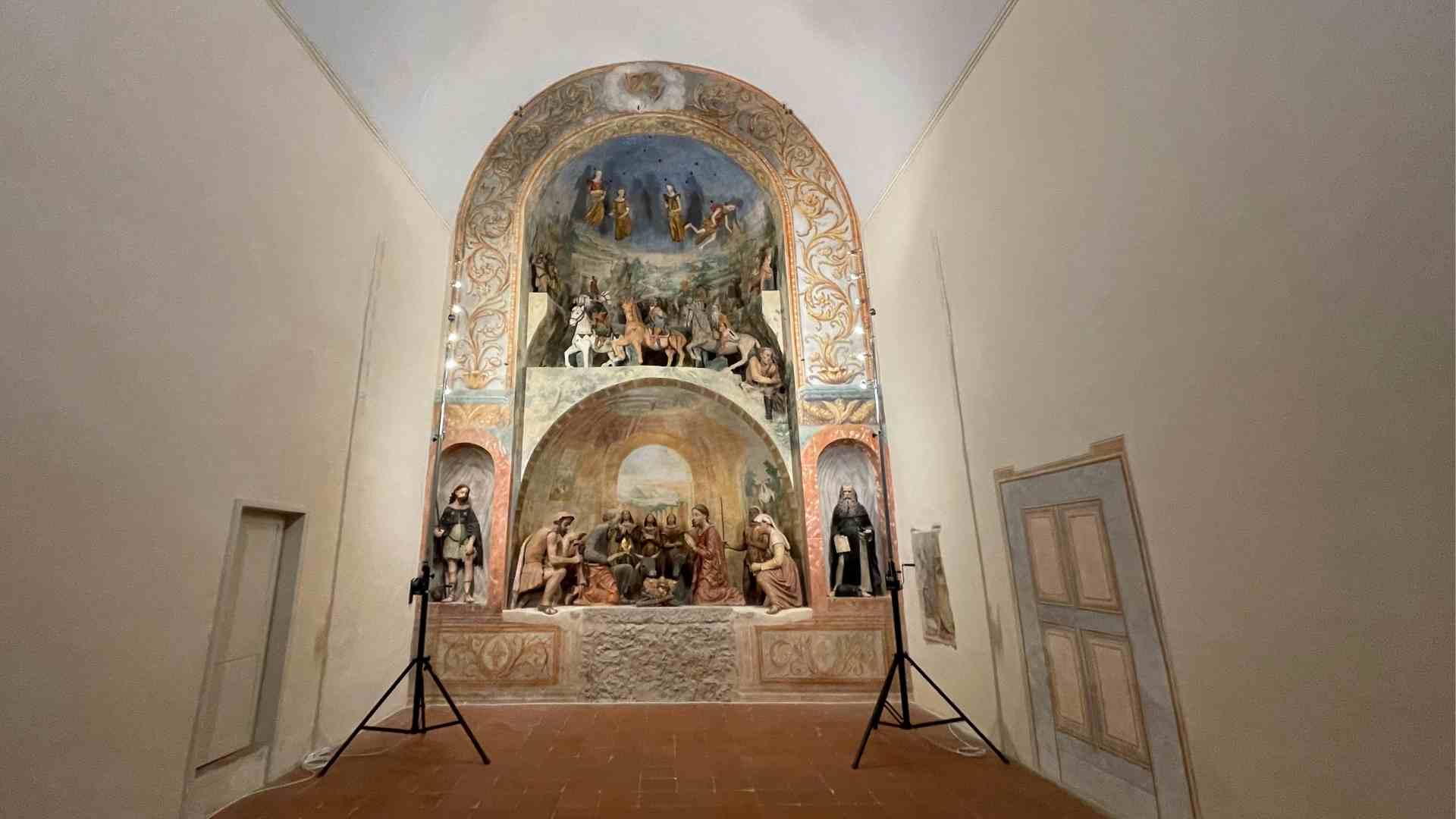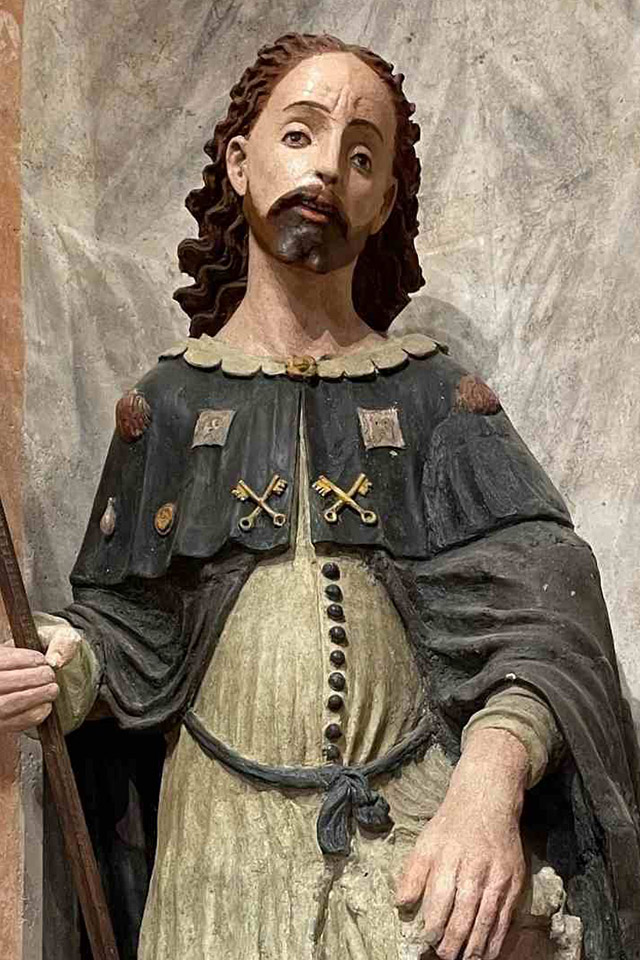
punto di interesse
point of interest


The left entrance of the big facade in Piazza Mazzini, thought by Ferdinando Fuga, bring us inside the Oratory of Sant’Antonio Abate which preservers one of the most prestigious work of Calvi dell’Umbria: the Monumental Crib made in the XVI century by Giacomo and Raffaele da Montereale from Abruzzo.
Part of the tour of the Museum of the Monastery of the Ursuline, the oratory hosts this work in polychrome terracotta which represents the Nativity with the statues arranged on four overlapping registers.

The left entrance of the big facade in Piazza Mazzini, thought by Ferdinando Fuga, bring us inside the Oratory of Sant’Antonio Abate which preservers one of the most prestigious work of Calvi dell’Umbria: the Monumental Crib made in the XVI century by Giacomo and Raffaele da Montereale from Abruzzo.
Part of the tour of the Museum of the Monastery of the Ursuline, the oratory hosts this work in polychrome terracotta which represents the Nativity with the statues arranged on four overlapping registers.

On the ground the Holy Family with Joseph and Mary praying and the child with ox and donkey surrounded by a bagpiper, a peasant, an old blind woman and an angel playing an organ.
In the upper floor, supported by an arch, the Magi on horseback followed even higher by their procession.
In the upper basin, painted as a vault of heaven there are four angels with wings wide open.
On the right, place in two niches, the two prestigious statues of Sant’Antonio and San Rocco, both with similar characteristics: both healers, both protectors against epidemics.
From a payment document we know that the work is dated 1545 and the authors are Giacomo and Raffaele da Montereale, known even as painters of the Cribs. Together with them , work for sure some helpers, and we can say this both from the differences of style and hand for the secondary figures.
The figures of the central scene are, without doubt , made by the brothers because we can recognize the noble execution which, in some cases, have belonged even to other big artists of the period who, for sure, had influenced the Montereale.
The part dedicated to Nativity , at the origin , was for sure a complex scene and rich of characters, but the intervention of the Fuga – aimed at reducing the oratory in favor of the Church of Santa Brigida – tampered with the backdrop and some statues.

On the ground the Holy Family with Joseph and Mary praying and the child with ox and donkey surrounded by a bagpiper, a peasant, an old blind woman and an angel playing an organ.
In the upper floor, supported by an arch, the Magi on horseback followed even higher by their procession.
In the upper basin, painted as a vault of heaven there are four angels with wings wide open.
On the right, place in two niches, the two prestigious statues of Sant’Antonio and San Rocco, both with similar characteristics: both healers, both protectors against epidemics.
From a payment document we know that the work is dated 1545 and the authors are Giacomo and Raffaele da Montereale, known even as painters of the Cribs. Together with them , work for sure some helpers, and we can say this both from the differences of style and hand for the secondary figures.
The figures of the central scene are, without doubt , made by the brothers because we can recognize the noble execution which, in some cases, have belonged even to other big artists of the period who, for sure, had influenced the Montereale.
The part dedicated to Nativity , at the origin , was for sure a complex scene and rich of characters, but the intervention of the Fuga – aimed at reducing the oratory in favor of the Church of Santa Brigida – tampered with the backdrop and some statues.

Continue the tour inside the old town , and if you didn’t before:
Or discover the points of interest of Calvi and of its territory:
discover all the points of interest of the village
Information, appointments and travel proposals on:
The Progressive Web App is part of the project “Le Terre dei Borghi Verdi”, realized in collaboration and with the contribution of Regione Umbria – Assessorato al Turismo
©2021 Le Terre dei Borghi Verdi
Le Terre dei Borghi Verdi
Welcome in Southern Umbria,
where the slowness becomes value
Information, appointments and travel proposals on:
The Progressive Web App is part of the project “Le Terre dei Borghi Verdi”, realized in collaboration and with the contribution of Regione Umbria – Assessorato al Turismo
©2021 Le Terre dei Borghi Verdi